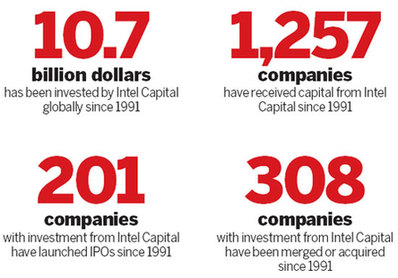
As the company is investing as a part of Intel's overall investment strategy, Sodhani and his team were ordered to focus on areas that are important to Intel. Those include mobility, cloud computing, software services and market expansion.

"We expect a very high rate of return from our investment, so all our investments are made with two focuses. One is strategic relevance to the corporation. The other is the financial reliability of the return," said Sodhani.
"We are pursuing the strategic objectives of the corporation but we are very careful from the financial perspective. We only do deals that make sense," he added.
In addition, Sodhani doesn't think prudent investment moves would hinder Intel Capital's presence in China. From his point of view, Intel Capital can be a "very patient investor" and not just seek short-term profit.
Although China has a huge market and is now the world's second-largest economy after the United States, Sodhani said the nation still has a long way to go before it can catch up with the US in terms of entrepreneurship and technological innovation.
"We will not put 50 percent of our investment pot in China because it does not have enough companies for us to invest in. Every country is at its own stage of development," he said. "Silicon Valley is the cradle of startups. There are maybe 50 startups there every two weeks."
The Chinese government has made "an enormous effort" to encourage innovation and entrepreneurship, Sodhani added.
"I think it has done more than any other country, including the United States, to spur innovation. However, it will take time for Chinese cities to become the next Silicon Valley because it requires an ecosystem," he said. "My suspicion is that Chinese companies may start looking and speculating, and they will start to go overseas when the growth rate slows down dramatically, and that's maybe 20 years from now."
Intel Capital's investment in China is significantly higher than in other emerging markets. The company set up a $250 million fund in India, a country famous for its electronics and manufacturing industries. The sum is less than half of its investment in China.
"When the current fund is exhausted we will announce another fund in China," said Sodhani, without elaborating.
Shortly before his meeting with global media, Sodhani predicted voice control technology will be Intel Capital's next investment priority. He gave a demonstration of Dragon, Intel's newly developed voice control system similar to Apple Inc's Siri, showing an audience how to use it to search the Internet, browse Web pages and even play a Gangnam-style video.
Voice-control technology will not only be a trend for Intel Capital. It will be a mega trend for virtually everybody, he said.
"Voice is not like a mouse or keyboard. The amount of computing it requires - even the simplest instruction made by speech - is huge," he said, adding that Intel Capital is looking for companies that will solve issues surrounding speech commands.
Related: Intel's investment strategy